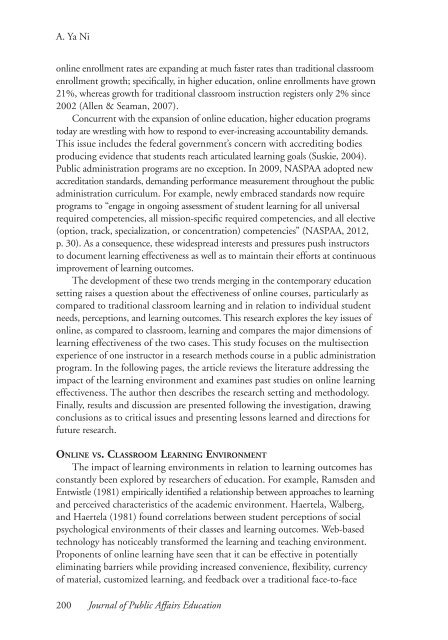Comparing the Effectiveness of Classroom and Online Learning ...
Comparing the Effectiveness of Classroom and Online Learning ...
Comparing the Effectiveness of Classroom and Online Learning ...
Create successful ePaper yourself
Turn your PDF publications into a flip-book with our unique Google optimized e-Paper software.
A. Ya Ni<br />
online enrollment rates are exp<strong>and</strong>ing at much faster rates than traditional classroom<br />
enrollment growth; specifically, in higher education, online enrollments have grown<br />
21%, whereas growth for traditional classroom instruction registers only 2% since<br />
2002 (Allen & Seaman, 2007).<br />
Concurrent with <strong>the</strong> expansion <strong>of</strong> online education, higher education programs<br />
today are wrestling with how to respond to ever-increasing accountability dem<strong>and</strong>s.<br />
This issue includes <strong>the</strong> federal government’s concern with accrediting bodies<br />
producing evidence that students reach articulated learning goals (Suskie, 2004).<br />
Public administration programs are no exception. In 2009, NASPAA adopted new<br />
accreditation st<strong>and</strong>ards, dem<strong>and</strong>ing performance measurement throughout <strong>the</strong> public<br />
administration curriculum. For example, newly embraced st<strong>and</strong>ards now require<br />
programs to “engage in ongoing assessment <strong>of</strong> student learning for all universal<br />
required competencies, all mission-specific required competencies, <strong>and</strong> all elective<br />
(option, track, specialization, or concentration) competencies” (NASPAA, 2012,<br />
p. 30). As a consequence, <strong>the</strong>se widespread interests <strong>and</strong> pressures push instructors<br />
to document learning effectiveness as well as to maintain <strong>the</strong>ir efforts at continuous<br />
improvement <strong>of</strong> learning outcomes.<br />
The development <strong>of</strong> <strong>the</strong>se two trends merging in <strong>the</strong> contemporary education<br />
setting raises a question about <strong>the</strong> effectiveness <strong>of</strong> online courses, particularly as<br />
compared to traditional classroom learning <strong>and</strong> in relation to individual student<br />
needs, perceptions, <strong>and</strong> learning outcomes. This research explores <strong>the</strong> key issues <strong>of</strong><br />
online, as compared to classroom, learning <strong>and</strong> compares <strong>the</strong> major dimensions <strong>of</strong><br />
learning effectiveness <strong>of</strong> <strong>the</strong> two cases. This study focuses on <strong>the</strong> multisection<br />
experience <strong>of</strong> one instructor in a research methods course in a public administration<br />
program. In <strong>the</strong> following pages, <strong>the</strong> article reviews <strong>the</strong> literature addressing <strong>the</strong><br />
impact <strong>of</strong> <strong>the</strong> learning environment <strong>and</strong> examines past studies on online learning<br />
effectiveness. The author <strong>the</strong>n describes <strong>the</strong> research setting <strong>and</strong> methodology.<br />
Finally, results <strong>and</strong> discussion are presented following <strong>the</strong> investigation, drawing<br />
conclusions as to critical issues <strong>and</strong> presenting lessons learned <strong>and</strong> directions for<br />
future research.<br />
<strong>Online</strong> vs. <strong>Classroom</strong> <strong>Learning</strong> Environment<br />
The impact <strong>of</strong> learning environments in relation to learning outcomes has<br />
constantly been explored by researchers <strong>of</strong> education. For example, Ramsden <strong>and</strong><br />
Entwistle (1981) empirically identified a relationship between approaches to learning<br />
<strong>and</strong> perceived characteristics <strong>of</strong> <strong>the</strong> academic environment. Haertela, Walberg,<br />
<strong>and</strong> Haertela (1981) found correlations between student perceptions <strong>of</strong> social<br />
psychological environments <strong>of</strong> <strong>the</strong>ir classes <strong>and</strong> learning outcomes. Web-based<br />
technology has noticeably transformed <strong>the</strong> learning <strong>and</strong> teaching environment.<br />
Proponents <strong>of</strong> online learning have seen that it can be effective in potentially<br />
eliminating barriers while providing increased convenience, flexibility, currency<br />
<strong>of</strong> material, customized learning, <strong>and</strong> feedback over a traditional face-to-face<br />
200 Journal <strong>of</strong> Public Affairs Education
















